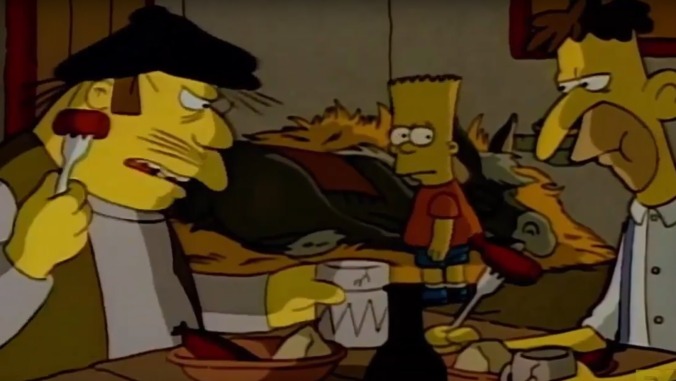Take a tour of Franco-Canadian relations with this look at region-specific Simpsons dubs

Despite being a quintessentially American show, The Simpsons is syndicated across the world and its familiar voices dubbed over by actors speaking different languages. In English-speaking countries, the original cast is left as is: Anglo-Canadian Homer is Dan Castellaneta and British Lisa is Yeardley Smith. In Canada and French-speaking Europe, though, The Simpsons is broadcast—and culturally localized—into both Québec and France French.
Twitter user @matttomic ran through a fascinating look at how these dubs compare, helpfully adding that, because apparently all relationships between the diaspora and their ancestral homes must suck, “fans of the Québec dub hate the European dub, and vice versa.”
Aside from the important fact that European Milhouse is from an entirely different country than the Simpson family, it’s the difference in localization approaches that’s most interesting. @matttomic points out that the Canadian version “[subs] in Québécois politicians or places for the more US-centric references,” which is wild considering that, you know, Québec shares a border with the United States and Canada and, for better or worse, takes in a whole lot of American media and culture.
It’s important to note here that, yes, of course there is a Québécois version of “Steamed Hams” and, through it, you can see exactly how this process works. The English version burned into every modern internet user’s mind, the changes are clear. The wording of the joke itself is changed to fit another language’s pronunciation and Skinner’s “ham vapeurs” are named after what rural Québécois in Lac Saint-Jean call hamburgers. Also, in case you were wondering, Superintendent Chalmers is from Jonquière in Sagquenay.
To really see how deep this rabbit hole goes (and to see how ridiculous countries can be about shit-talking each other’s dialects), @matttomic looks at how Quebecois Bart’s trip to France went from a linguistic standpoint, too.
The thread is interesting enough that even writer Bill Oakley has mentioned it, but it also opens up a deep well of study between how various regions, after new dialects emerge over centuries of separation, diverge both linguistically and culturally. Some cartoon-addled grad student must be writing a paper on this as we speak.
Send Great Job, Internet tips to [email protected]